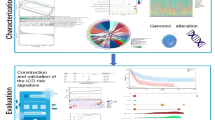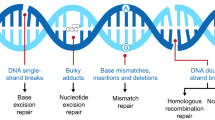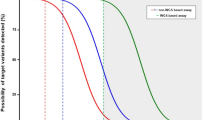Abstract
The immune context of the tumor microenvironment (TME) is critical for effective immunotherapy. Nonetheless, DNA-based biomarkers for the immune-sensitive TME and the identification of immune checkpoint inhibitor (ICI) responders are under-explored. This study aims to comprehensively landscape the homologous recombination deficiency (HRD) score, an emerging hallmark for tumor genome instability that triggers immune responsiveness across major cancer types, and to unveil their link to the TME and immunotherapeutic response. The HRD-associated genomic scars were characterized in 9088 tumor samples across 32 cancer types from TCGA. We evaluated the HRD score’s performance in classifying ICI responders using an independent breast cancer cohort (GSE87049) and 11 in vivo murine mammary tumor models treated with anti-PD1/CTLA4 regimen (GSE124821). This study revealed a broad association between HRD-high genotype and neoantigenesis in the major cancer types including bladder cancer, breast cancer, head and neck squamous carcinoma, lung adenocarcinoma, lung squamous cell carcinoma, ovarian cancer, and sarcoma. Tumors with high HRD score bears increased leukocyte infiltration and lymphocyte fraction and demonstrated immune-sensitive microenvironment. The tumor immune dysfunction and exclusion (TIDE) model further confirmed HRD score-high genotype as a potential predictor for ICI immunotherapy responders in breast cancer. In conclusion, tumors with high HRD score exhibit an immune-sensitive TME. The HRD-high genotype is a promising marker for identifying ICI therapy responders among breast cancer patients.






Similar content being viewed by others
Data availability
All data generated or analyzed during this study are included in this published article (and its supplementary information files).
Abbreviations
- ICI:
-
Immune checkpoint inhibitors
- TME:
-
Tumor microenvironment
- TMB:
-
Tumor mutation burden
- MSI:
-
Microsatellite instability
- GEP:
-
Gene expression profile
- PARPi:
-
PARP protein inhibition
- HRD:
-
Homologous recombination deficiency
- TCGA:
-
The Cancer Genomic Atlas
- BRCA:
-
Breast invasive carcinoma
- CCLE:
-
Cancer Cell Line Encyclopedia
- LOH:
-
Loss of heterogeneity
- TAI:
-
Telomeric-allelic imbalance
- LST:
-
Large-scale state transitions
- DEG:
-
Differentially expressed gene
- tSNE:
-
T-distributed stochastic neighbor embedding
- TIDE:
-
Tumor immune dysfunction and exclusion
- MDSC:
-
Myeloid-derived suppressor cell
- CTL:
-
Cytotoxic T lymphocyte
- TAM-M2:
-
Tumor-associated macrophages-M2
- CAF:
-
Cancer-associated fibroblast
- OV:
-
Ovarian serous cystadenocarcinoma
- UCS:
-
Uterine carcinosarcoma
- LUAD:
-
Lung adenocarcinoma
- LUSC:
-
Lung squamous cell carcinoma
- ESCA:
-
Esophageal carcinoma
- SARC:
-
Sarcoma
- BLCA:
-
Bladder urothelial carcinoma
- STAD:
-
Stomach adenocarcinoma
- HNSC:
-
Head and neck squamous carcinoma
- PAAD:
-
Pancreatic ductal adenocarcinoma
- PRAD:
-
Prostate adenocarcinoma (PRAD)
- COAD:
-
Colon adenocarcinoma
- UCEC:
-
Uterine corpus endometrial carcinoma
References
Hodi FS, O’Day SJ, McDermott DF, Weber RW, Sosman JA, Haanen JB, et al. Improved survival with ipilimumab in patients with metastatic melanoma. N Engl J Med. 2010;363(8):711–23. https://doi.org/10.1056/NEJMoa1003466.
Forde PM, Chaft JE, Smith KN, Anagnostou V, Cottrell TR, Hellmann MD, et al. Neoadjuvant PD-1 blockade in resectable lung cancer. N Engl J Med. 2018;378(21):1976–86. https://doi.org/10.1056/NEJMoa1716078.
Schmid P, Adams S, Rugo HS, Schneeweiss A, Barrios CH, Iwata H, et al. Atezolizumab and nab-paclitaxel in advanced triple-negative breast cancer. N Engl J Med. 2018;379(22):2108–21. https://doi.org/10.1056/NEJMoa1809615.
Ribas A. Releasing the brakes on cancer immunotherapy. N Engl J Med. 2015;373(16):1490–2. https://doi.org/10.1056/NEJMp1510079.
Parkhurst M, Gros A, Pasetto A, Prickett T, Crystal JS, Robbins P, et al. Isolation of T-cell receptors specifically reactive with mutated tumor-associated antigens from tumor-infiltrating lymphocytes based on CD137 expression. Clin Cancer Res. 2017;23(10):2491–505. https://doi.org/10.1158/1078-0432.CCR-16-2680.
Mardis ER. Neoantigens and genome instability: impact on immunogenomic phenotypes and immunotherapy response. Genome Med. 2019;11(1):71. https://doi.org/10.1186/s13073-019-0684-0.
Palumbo A Jr, Da Costa NO, Bonamino MH, Pinto LF, Nasciutti LE. Genetic instability in the tumor microenvironment: a new look at an old neighbor. Mol Cancer. 2015;14:145. https://doi.org/10.1186/s12943-015-0409-y.
Bareche Y, Buisseret L, Gruosso T, Girard E, Venet D, Dupont F, et al. Unraveling triple-negative breast cancer tumor microenvironment heterogeneity: towards an optimized treatment approach. J Natl Cancer Inst. 2020;112(7):708–19. https://doi.org/10.1093/jnci/djz208.
Cristescu R, Mogg R, Ayers M, Albright A, Murphy E, Yearley J, et al. Pan-tumor genomic biomarkers for PD-1 checkpoint blockade-based immunotherapy. Science. 2018. https://doi.org/10.1126/science.aar3593.
Samstein RM, Lee CH, Shoushtari AN, Hellmann MD, Shen R, Janjigian YY, et al. Tumor mutational load predicts survival after immunotherapy across multiple cancer types. Nat Genet. 2019;51(2):202–6. https://doi.org/10.1038/s41588-018-0312-8.
Ganesh K, Stadler ZK, Cercek A, Mendelsohn RB, Shia J, Segal NH, et al. Immunotherapy in colorectal cancer: rationale, challenges and potential. Nat Rev Gastroenterol Hepatol. 2019;16(6):361–75. https://doi.org/10.1038/s41575-019-0126-x.
Chan TA, Yarchoan M, Jaffee E, Swanton C, Quezada SA, Stenzinger A, et al. Development of tumor mutation burden as an immunotherapy biomarker: utility for the oncology clinic. Ann Oncol. 2019;30(1):44–56. https://doi.org/10.1093/annonc/mdy495.
Gibney GT, Weiner LM, Atkins MB. Predictive biomarkers for checkpoint inhibitor-based immunotherapy. Lancet Oncol. 2016;17(12):e542–51. https://doi.org/10.1016/S1470-2045(16)30406-5.
Jamieson NB, Maker AV. Gene-expression profiling to predict responsiveness to immunotherapy. Cancer Gene Ther. 2017;24(3):134–40. https://doi.org/10.1038/cgt.2016.63.
Lu S, Stein JE, Rimm DL, Wang DW, Bell JM, Johnson DB, et al. Comparison of biomarker modalities for predicting response to PD-1/PD-L1 checkpoint blockade: a systematic review and meta-analysis. JAMA Oncol. 2019. https://doi.org/10.1001/jamaoncol.2019.1549.
Scully R, Panday A, Elango R, Willis NA. DNA double-strand break repair-pathway choice in somatic mammalian cells. Nat Rev Mol Cell Biol. 2019;20(11):698–714. https://doi.org/10.1038/s41580-019-0152-0.
Lord CJ, Ashworth A. BRCAness revisited. Nat Rev Cancer. 2016;16(2):110–20. https://doi.org/10.1038/nrc.2015.21.
Jeggo PA, Pearl LH, Carr AM. DNA repair, genome stability and cancer: a historical perspective. Nat Rev Cancer. 2016;16(1):35–42. https://doi.org/10.1038/nrc.2015.4.
Tumiati M, Hietanen S, Hynninen J, Pietila E, Farkkila A, Kaipio K, et al. A functional homologous recombination assay predicts primary chemotherapy response and long-term survival in ovarian cancer patients. Clin Cancer Res. 2018;24(18):4482–93. https://doi.org/10.1158/1078-0432.CCR-17-3770.
Yang D, Khan S, Sun Y, Hess K, Shmulevich I, Sood AK, et al. Association of BRCA1 and BRCA2 mutations with survival, chemotherapy sensitivity, and gene mutator phenotype in patients with ovarian cancer. JAMA. 2011;306(14):1557–65. https://doi.org/10.1001/jama.2011.1456.
Lord CJ, Ashworth A. PARP inhibitors: synthetic lethality in the clinic. Science. 2017;355(6330):1152–8. https://doi.org/10.1126/science.aam7344.
Robson ME, Tung N, Conte P, Im SA, Senkus E, Xu B, et al. OlympiAD final overall survival and tolerability results: Olaparib versus chemotherapy treatment of physician’s choice in patients with a germline BRCA mutation and HER2-negative metastatic breast cancer. Ann Oncol. 2019;30(4):558–66. https://doi.org/10.1093/annonc/mdz012.
Gonzalez-Martin A, Pothuri B, Vergote I, DePont CR, Graybill W, Mirza MR, et al. Niraparib in patients with newly diagnosed advanced ovarian cancer. N Engl J Med. 2019;381(25):2391–402. https://doi.org/10.1056/NEJMoa1910962.
Ray-Coquard I, Pautier P, Pignata S, Perol D, Gonzalez-Martin A, Berger R, et al. Olaparib plus bevacizumab as first-line maintenance in ovarian cancer. N Engl J Med. 2019;381(25):2416–28. https://doi.org/10.1056/NEJMoa1911361.
Telli ML, Timms KM, Reid J, Hennessy B, Mills GB, Jensen KC, et al. Homologous recombination deficiency (hrd) score predicts response to platinum-containing neoadjuvant chemotherapy in patients with triple-negative breast cancer. Clin Cancer Res. 2016;22(15):3764–73. https://doi.org/10.1158/1078-0432.CCR-15-2477.
Timms KM, Abkevich V, Hughes E, Neff C, Reid J, Morris B, et al. Association of BRCA1/2 defects with genomic scores predictive of DNA damage repair deficiency among breast cancer subtypes. Breast Cancer Res. 2014;16(6):475. https://doi.org/10.1186/s13058-014-0475-x.
Ghandi M, Huang FW, Jane-Valbuena J, Kryukov GV, Lo CC, McDonald ER 3rd, et al. Next-generation characterization of the cancer cell line encyclopedia. Nature. 2019;569(7757):503–8. https://doi.org/10.1038/s41586-019-1186-3.
Romero-Cordoba SL, Salido-Guadarrama I, Rebollar-Vega R, Bautista-Pina V, Dominguez-Reyes C, Tenorio-Torres A, et al. Comprehensive omic characterization of breast cancer in Mexican-Hispanic women. Nat Commun. 2021;12(1):2245. https://doi.org/10.1038/s41467-021-22478-5.
Hollern DP, Xu N, Thennavan A, Glodowski C, Garcia-Recio S, Mott KR, et al. B Cells and T follicular helper cells mediate response to checkpoint inhibitors in high mutation burden mouse models of breast cancer. Cell. 2019;179(5):1191-206 e21. https://doi.org/10.1016/j.cell.2019.10.028.
Sztupinszki Z, Diossy M, Krzystanek M, Reiniger L, Csabai I, Favero F, et al. Migrating the SNP array-based homologous recombination deficiency measures to next generation sequencing data of breast cancer. NPJ Breast Cancer. 2018;4:16. https://doi.org/10.1038/s41523-018-0066-6.
Favero F, Joshi T, Marquard AM, Birkbak NJ, Krzystanek M, Li Q, et al. Sequenza: allele-specific copy number and mutation profiles from tumor sequencing data. Ann Oncol. 2015;26(1):64–70. https://doi.org/10.1093/annonc/mdu479.
Knijnenburg TA, Wang L, Zimmermann MT, Chambwe N, Gao GF, Cherniack AD, et al. Genomic and molecular landscape of DNA damage repair deficiency across the cancer genome atlas. Cell Rep. 2018;23(1):239–546. https://doi.org/10.1016/j.celrep.2018.03.076.
Chalmers ZR, Connelly CF, Fabrizio D, Gay L, Ali SM, Ennis R, et al. Analysis of 100,000 human cancer genomes reveals the landscape of tumor mutational burden. Genome Med. 2017;9(1):34. https://doi.org/10.1186/s13073-017-0424-2.
Thorsson V, Gibbs DL, Brown SD, Wolf D, Bortone DS, Ou Yang TH, et al. The immune landscape of cancer. Immunity. 2018;48(4):812–3014. https://doi.org/10.1016/j.immuni.2018.03.023.
Yoshihara K, Shahmoradgoli M, Martinez E, Vegesna R, Kim H, Torres-Garcia W, et al. Inferring tumour purity and stromal and immune cell admixture from expression data. Nat Commun. 2013;4:2612. https://doi.org/10.1038/ncomms3612.
Rooney MS, Shukla SA, Wu CJ, Getz G, Hacohen N. Molecular and genetic properties of tumors associated with local immune cytolytic activity. Cell. 2015;160(1–2):48–61. https://doi.org/10.1016/j.cell.2014.12.033.
Petitprez F, Levy S, Sun CM, Meylan M, Linhard C, Becht E, et al. The murine Microenvironment Cell Population counter method to estimate abundance of tissue-infiltrating immune and stromal cell populations in murine samples using gene expression. Genome Med. 2020;12(1):86. https://doi.org/10.1186/s13073-020-00783-w.
Jiang P, Gu S, Pan D, Fu J, Sahu A, Hu X, et al. Signatures of T cell dysfunction and exclusion predict cancer immunotherapy response. Nat Med. 2018;24(10):1550–8. https://doi.org/10.1038/s41591-018-0136-1.
Bonneville R, Krook MA, Kautto EA, Miya J, Wing MR, Chen HZ, et al. Landscape of microsatellite instability across 39 cancer types. JCO Precis Oncol. 2017. https://doi.org/10.1200/PO.17.00073.
Alexandrov LB, Nik-Zainal S, Siu HC, Leung SY, Stratton MR. A mutational signature in gastric cancer suggests therapeutic strategies. Nat Commun. 2015;6:8683. https://doi.org/10.1038/ncomms9683.
Takamatsu S, Brown JB, Yamaguchi K, Hamanishi J, Yamanoi K, Takaya H, et al. Utility of homologous recombination deficiency biomarkers across cancer types. JCO Precis Oncol. 2021. https://doi.org/10.1200/PO.21.00141.
Ceccaldi R, Rondinelli B, D’Andrea AD. Repair pathway choices and consequences at the double-strand break. Trends Cell Biol. 2016;26(1):52–64. https://doi.org/10.1016/j.tcb.2015.07.009.
Piazza A, Heyer WD. Homologous recombination and the formation of complex genomic rearrangements. Trends Cell Biol. 2019;29(2):135–49. https://doi.org/10.1016/j.tcb.2018.10.006.
Quail DF, Joyce JA. Microenvironmental regulation of tumor progression and metastasis. Nat Med. 2013;19(11):1423–37. https://doi.org/10.1038/nm.3394.
Guo S, Deng CX. Effect of stromal cells in tumor microenvironment on metastasis initiation. Int J Biol Sci. 2018;14(14):2083–93. https://doi.org/10.7150/ijbs.25720.
Golshan M, Loibl S, Wong SM, Houber JB, O’Shaughnessy J, Rugo HS, et al. Breast conservation after neoadjuvant chemotherapy for triple-negative breast cancer: surgical results from the brightness randomized clinical trial. JAMA Surg. 2020;155(3): e195410. https://doi.org/10.1001/jamasurg.2019.5410.
Evron E, Ben-David AM, Goldberg H, Fried G, Kaufman B, Catane R, et al. Prophylactic irradiation to the contralateral breast for BRCA mutation carriers with early-stage breast cancer. Ann Oncol. 2019;30(3):412–7. https://doi.org/10.1093/annonc/mdy515.
Poggio F, Bruzzone M, Ceppi M, Ponde NF, La Valle G, Del Mastro L, et al. Platinum-based neoadjuvant chemotherapy in triple-negative breast cancer: a systematic review and meta-analysis. Ann Oncol. 2018;29(7):1497–508. https://doi.org/10.1093/annonc/mdy127.
Robson M, Im SA, Senkus E, Xu B, Domchek SM, Masuda N, et al. Olaparib for metastatic breast cancer in patients with a germline BRCA mutation. N Engl J Med. 2017;377(6):523–33. https://doi.org/10.1056/NEJMoa1706450.
Weber F, Shen L, Fukino K, Patocs A, Mutter GL, Caldes T, et al. Total-genome analysis of BRCA1/2-related invasive carcinomas of the breast identifies tumor stroma as potential landscaper for neoplastic initiation. Am J Hum Genet. 2006;78(6):961–72. https://doi.org/10.1086/504090.
Hemalatha SK, Sengodan SK, Nadhan R, Dev J, Sushama RR, Somasundaram V, et al. Brcal defective breast cancer cells induce in vitro transformation of cancer associated fibroblasts (CAFs) to metastasis associated fibroblasts (MAF). Sci Rep. 2018;8(1):13903. https://doi.org/10.1038/s41598-018-32370-w.
Ryan D, Paul BT, Koziol J, ElShamy WM. The pro- and anti-tumor roles of mesenchymal stem cells toward BRCA1-IRIS-overexpressing TNBC cells. Breast Cancer Res. 2019;21(1):53. https://doi.org/10.1186/s13058-019-1131-2.
Loibl S, Weber KE, Timms KM, Elkin EP, Hahnen E, Fasching PA, et al. Survival analysis of carboplatin added to an anthracycline/taxane-based neoadjuvant chemotherapy and HRD score as predictor of response-final results from GeparSixto. Ann Oncol. 2018;29(12):2341–7. https://doi.org/10.1093/annonc/mdy460.
Mayer EL, Abramson V, Jankowitz R, Falkson C, Marcom PK, Traina T, et al. TBCRC 030: a phase II study of preoperative cisplatin versus paclitaxel in triple-negative breast cancer: evaluating the homologous recombination deficiency (HRD) biomarker. Ann Oncol. 2020;31(11):1518–25. https://doi.org/10.1016/j.annonc.2020.08.2064.
Fasching PA, Link T, Hauke J, Seither F, Jackisch C, Klare P, et al. Neoadjuvant paclitaxel/olaparib in comparison to paclitaxel/carboplatinum in patients with HER2-negative breast cancer and homologous recombination deficiency (GeparOLA study). Ann Oncol. 2021;32(1):49–57. https://doi.org/10.1016/j.annonc.2020.10.471.
Samstein RM, Krishna C, Ma X, Pei X, Lee K-W, Makarov V, et al. Mutations in BRCA1 and BRCA2 differentially affect the tumor microenvironment and response to checkpoint blockade immunotherapy. Nature Cancer. 2020;1(12):1188–203.
Minussi DC, Nicholson MD, Ye H, Davis A, Wang K, Baker T, et al. Breast tumours maintain a reservoir of subclonal diversity during expansion. Nature. 2021. https://doi.org/10.1038/s41586-021-03357-x.
Kim C, Gao R, Sei E, Brandt R, Hartman J, Hatschek T, et al. Chemoresistance evolution in triple-negative breast cancer delineated by single-cell sequencing. Cell. 2018;173(4):879-931e3. https://doi.org/10.1016/j.cell.2018.03.041.
De Paolis E, De Bonis M, Concolino P, Piermattei A, Fagotti A, Urbani A, et al. Droplet digital PCR for large genomic rearrangements detection: a promising strategy in tissue BRCA1 testing. Clin Chim Acta. 2021;513:17–24. https://doi.org/10.1016/j.cca.2020.12.001.
Glodzik D, Bosch A, Hartman J, Aine M, Vallon-Christersson J, Reutersward C, et al. Comprehensive molecular comparison of BRCA1 hypermethylated and BRCA1 mutated triple negative breast cancers. Nat Commun. 2020;11(1):3747. https://doi.org/10.1038/s41467-020-17537-2.
Konstantinopoulos PA, Spentzos D, Karlan BY, Taniguchi T, Fountzilas E, Francoeur N, et al. Gene expression profile of BRCAness that correlates with responsiveness to chemotherapy and with outcome in patients with epithelial ovarian cancer. J Clin Oncol. 2010;28(22):3555–61. https://doi.org/10.1200/JCO.2009.27.5719.
Mulligan JM, Hill LA, Deharo S, Irwin G, Boyle D, Keating KE, et al. Identification and validation of an anthracycline/cyclophosphamide-based chemotherapy response assay in breast cancer. J Natl Cancer Inst. 2014;106(1):djt335. https://doi.org/10.1093/jnci/djt335.
Castroviejo-Bermejo M, Cruz C, Llop-Guevara A, Gutierrez-Enriquez S, Ducy M, Ibrahim YH, et al. A RAD51 assay feasible in routine tumor samples calls PARP inhibitor response beyond BRCA mutation. EMBO Mol Med. 2018. https://doi.org/10.15252/emmm.201809172.
Stover EH, Fuh K, Konstantinopoulos PA, Matulonis UA, Liu JF. Clinical assays for assessment of homologous recombination DNA repair deficiency. Gynecol Oncol. 2020;159(3):887–98. https://doi.org/10.1016/j.ygyno.2020.09.029.
Von Minckwitz G, Timms K, Untch M, Elkin EP, Fasching PA, Schneeweiss A et al. Prediction of pathological complete response (pCR) by homologous recombination deficiency (HRD) after carboplatin-containing neoadjuvant chemotherapy in patients with TNBC: Results from GeparSixto. American Society of Clinical Oncology; 2015.
Kim SJ, Sota Y, Naoi Y, Honma K, Kagara N, Miyake T, et al. Determining homologous recombination deficiency scores with whole exome sequencing and their association with responses to neoadjuvant chemotherapy in breast cancer. Transl Oncol. 2021;14(2): 100986. https://doi.org/10.1016/j.tranon.2020.100986.
Acknowledgements
We thank the contributions of The Cancer Genome Atlas (TCGA), Cancer Cell Line Encyclopedia (CCLE), and the National Center for Biotechnology Information Sequence Read Archive (NCBI-SRA) for providing free access to online data. We thank Dr. Anthony Brickner at the University of Pittsburgh for the language editing.
Funding
This study was supported by the National Natural Science Foundation of China [81802993, 82072367], Shanghai Municipal Key Clinical Specialty [shslczdzk03303] and the Innovation Group Project of Shanghai Municipal Health Commission [2019CXJQ03].
Author information
Authors and Affiliations
Contributions
CY, XMT, XJZ, YMC, TTH, HTZ, MG, ZXM, and ZYW contributed to the study concept and design. CY, ZZJ, ZYW, and XJZ: acquisition, analysis, and validation of data; YMC, TTH and HTZ: data curation; CY, ZYW, XMT, and XJZ: drafting the manuscript and revised; MG, XMZ and WZY: supervision, project administration; MG and ZYW: funding acquisition. All the authors read and approved the final manuscript.
Corresponding authors
Ethics declarations
Conflict of interest
The authors declare no potential conflicts of interest.
Ethics approval
The ethical approval is not applicable as all data in this study were downloaded from public databases (TCGA, CCLE, SRA, and GEO).
Consent to participate
The data processing met the TCGA, CCLE, and NCBI publication guidelines.
Consent for publication
Not applicable.
Additional information
Publisher's Note
Springer Nature remains neutral with regard to jurisdictional claims in published maps and institutional affiliations.
Supplementary Information
Below is the link to the electronic supplementary material.





Rights and permissions
About this article
Cite this article
Yang, C., Zhang, Z., Tang, X. et al. Pan-cancer analysis reveals homologous recombination deficiency score as a predictive marker for immunotherapy responders. Human Cell 35, 199–213 (2022). https://doi.org/10.1007/s13577-021-00630-z
Received:
Accepted:
Published:
Issue Date:
DOI: https://doi.org/10.1007/s13577-021-00630-z




